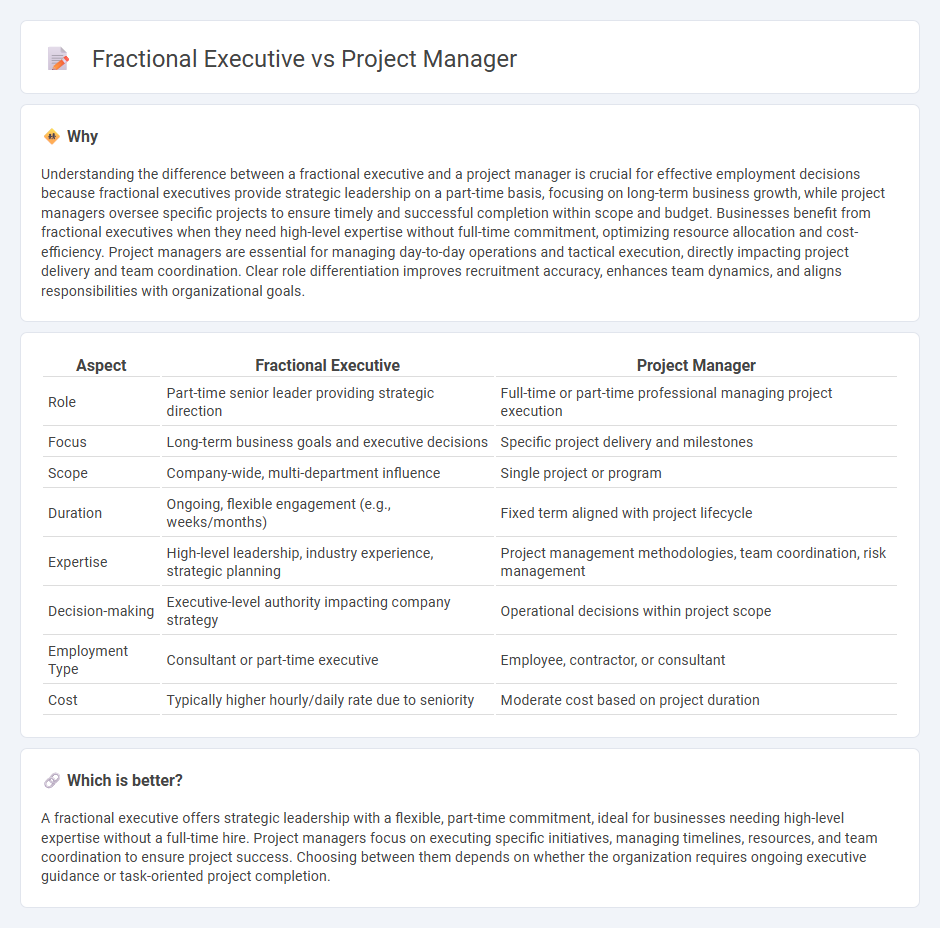
Fractional executives offer specialized leadership on a part-time basis, providing strategic direction without the full-time commitment, ideal for businesses seeking high-level expertise while managing costs. Project managers focus on planning, executing, and closing projects, ensuring objectives are met within scope, time, and budget constraints. Discover how choosing between a fractional executive and a project manager can transform your organization's success.
Why it is important
Understanding the difference between a fractional executive and a project manager is crucial for effective employment decisions because fractional executives provide strategic leadership on a part-time basis, focusing on long-term business growth, while project managers oversee specific projects to ensure timely and successful completion within scope and budget. Businesses benefit from fractional executives when they need high-level expertise without full-time commitment, optimizing resource allocation and cost-efficiency. Project managers are essential for managing day-to-day operations and tactical execution, directly impacting project delivery and team coordination. Clear role differentiation improves recruitment accuracy, enhances team dynamics, and aligns responsibilities with organizational goals.
Comparison Table
| Aspect | Fractional Executive | Project Manager |
|---|---|---|
| Role | Part-time senior leader providing strategic direction | Full-time or part-time professional managing project execution |
| Focus | Long-term business goals and executive decisions | Specific project delivery and milestones |
| Scope | Company-wide, multi-department influence | Single project or program |
| Duration | Ongoing, flexible engagement (e.g., weeks/months) | Fixed term aligned with project lifecycle |
| Expertise | High-level leadership, industry experience, strategic planning | Project management methodologies, team coordination, risk management |
| Decision-making | Executive-level authority impacting company strategy | Operational decisions within project scope |
| Employment Type | Consultant or part-time executive | Employee, contractor, or consultant |
| Cost | Typically higher hourly/daily rate due to seniority | Moderate cost based on project duration |
Which is better?
A fractional executive offers strategic leadership with a flexible, part-time commitment, ideal for businesses needing high-level expertise without a full-time hire. Project managers focus on executing specific initiatives, managing timelines, resources, and team coordination to ensure project success. Choosing between them depends on whether the organization requires ongoing executive guidance or task-oriented project completion.
Connection
Fractional executives and project managers both play crucial roles in optimizing organizational performance by providing targeted leadership and specialized expertise on a part-time or project-specific basis. Fractional executives focus on strategic decision-making and guiding company direction, while project managers ensure the successful execution of projects within scope, time, and budget constraints. Their collaboration enhances workforce flexibility, promotes efficient resource allocation, and drives goal achievement in dynamic business environments.
Key Terms
Leadership Scope
A project manager typically oversees specific initiatives, managing timelines, resources, and team coordination within a defined project scope. In contrast, a fractional executive provides high-level leadership across multiple departments or entire organizations on a part-time basis, driving strategic vision and long-term goals. Explore the key differences in leadership scope and decision-making impact to determine the best fit for your business needs.
Time Commitment
Project managers typically commit to full-time roles overseeing specific initiatives, ensuring deadlines and deliverables are met within a set timeframe. Fractional executives engage on a part-time basis, providing strategic leadership across multiple projects or organizations, maximizing efficiency without full-time involvement. Discover how aligning time commitment with your business needs can optimize project outcomes by exploring the roles further.
Organizational Integration
Project managers specialize in driving specific initiatives within defined scopes and timelines, ensuring tactical execution aligns with project goals. Fractional executives provide part-time strategic leadership to integrate organizational functions, foster cross-departmental collaboration, and align long-term business objectives. Discover how aligning organizational integration with these roles can enhance operational efficiency and strategic growth.
Source and External Links
Project manager - Wikipedia - A project manager is a professional responsible for planning, procurement, and execution of projects with defined scope, start, and finish, managing cost, time, scope, and quality to achieve project objectives and client satisfaction.
How To Become A Project Manager: The 2025 Guide - Teamwork.com - Project managers lead project planning and initiation, defining goals, creating timelines, allocating resources, and managing budgets to ensure successful project delivery.
What does a project manager do? - APM - Project managers handle day-to-day project management, overseeing scope, schedule, finance, risk, quality, and resources, while motivating teams, managing risks, and ensuring projects meet expected outcomes within budget and time constraints.
 dowidth.com
dowidth.com